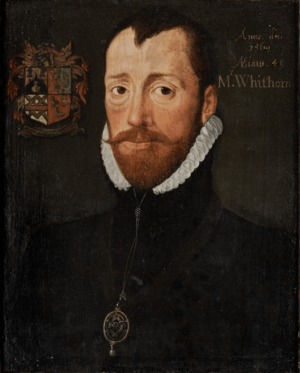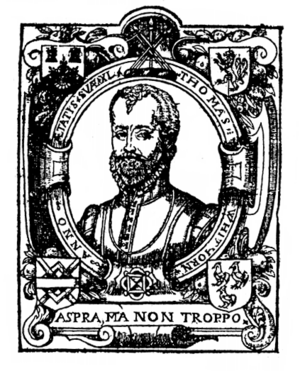Thomas Whythorne facts for kids
Thomas Whythorne (1528–1595) was an English composer who lived a long time ago. He wrote what many believe is the very first autobiography (a story of your own life) ever written in the English language that we still have today.
Contents
Who Was Thomas Whythorne?
Thomas Whythorne was born in Somerset, England, into a rich family. His last name, Whythorne, was a common way to spell "Whitehorn" in that area back then.
His Early Life and School Days
When he was young, Thomas was a chorister (a singer in a choir) at Magdalen College, Oxford. He also went to Magdalen College School. After finishing school, he briefly studied at Magdalen College itself. However, he left within a year to learn from a famous writer and musician named John Heywood.
Thomas didn't inherit enough money to live without working. So, he became a music teacher for many important and wealthy families.
Thomas Whythorne's Music Career
Thomas didn't like being treated like a servant by some of his employers. He felt he was better than them because of his family background and education. He really wanted to find a rich supporter, called a patron, who would let him focus only on writing music.
His music notes show that near the end of his life, he found a patron in Francis Hastings. We don't know much about their relationship, even though Thomas wrote a very long introduction about it.
Traveling and Learning Music
Thomas Whythorne traveled a lot around Europe. He spent six months in Italy, where he learned the Italian language and their style of music. He came back to England in 1555. He was very impressed by how much people in other countries respected music and musicians. He felt that England didn't appreciate music as much. Later, he complained about the "blockheads and dolts" (meaning silly or foolish people) in England who didn't understand music. Thomas also wrote a book about his travels in Italy, but sadly, no copies of it still exist.
Music Teacher and Published Works
After returning to England, Whythorne worked as a music teacher in Cambridge and London. He survived a terrible outbreak of the Bubonic plague in 1563. This plague killed some people in his own home.
In 1571, he became the master of music at the Chapel of Archbishop Parker. That same year, he published a book called Songes for Three, Fower, and Five voyces. This was a very important collection because it was the only English non-religious music known to have been published between 1530 and 1588. Another important work he wrote in 1590 was Duos or Songs for Two Voices.
Thomas Whythorne's Autobiography
Around 1576, Thomas Whythorne gathered all his songs and poems. He then added parts about his own life and the situations that made him write each song. The book he created was called booke of songs and sonetts with longe discourses sett with them.
This book is thought to be the earliest autobiography in English that we still have today. One of the songs in it, "Buy New Broom," is considered the oldest known example of music written for a voice with instruments playing along.
What His Autobiography Tells Us
Besides being important for music, Whythorne's autobiography also teaches us a lot about how people lived and behaved in the 1500s. It gives us a peek into the social customs of that time.
Why Thomas Whythorne Is Remembered
Thomas Whythorne was mostly forgotten until 1925. That's when a composer named Peter Warlock wrote a study called Thomas Whythorne, An Unknown Elizabethan Composer.
In 1955, a handwritten copy of Whythorne's autobiography was found in a box of papers. It was at the home of Major Foley in Hereford. This important manuscript is now kept at the Bodleian Library. The book, The Autobiography of Thomas Whythorne, was published twice by Oxford University Press. First, in 1961, it was printed using his original, old-fashioned spelling. Then, in 1962, it was published again with modern spelling to make it easier to read.
 | Janet Taylor Pickett |
 | Synthia Saint James |
 | Howardena Pindell |
 | Faith Ringgold |



